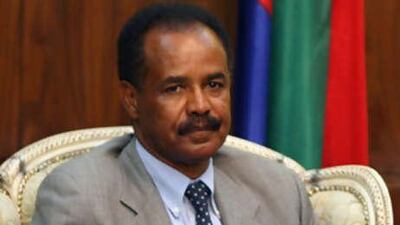TORONTO // Growing up in Eritrea, Semere Sibhatu learned in elementary school about his country's wealth of mineral resources. More than three decades later, Nevsun Resources, a company in Canada where Sibhatu now lives, is poised to translate that potential into production. But as chairman of Qalna (Our Voice), a Toronto-based Eritrean human rights group, he doubts Eritreans will be enriched by mining. "As long as the current government is in power, I don't think so," Mr Sibhatu said. Issaias Afeworki, the president who was once considered a hero for leading Eritreans to freedom from Ethiopian rule in 1991, runs a single-party state. His regime, the People's Front for Democracy and Justice, refuses to grant exit visas to anyone younger than 45 years of age. The mildest dissent is outlawed, and press freedom groups point out that Eritrean prisons hold the most journalists in Africa. Balhbi Malk, a former member of Eritrea's university student movement who now lives in Canada, argues the military government in Eritrea abuses human rights and the rule of law. He called Mr Afeworki the "most brutal dictator in Eritrean history". Nevsun, however, considers the Eritrean government its partner after more than a decade of exploration. In 2002, the mining company, listed on the Toronto Stock Exchange, made a "world-class discovery", according to John Clarke, its vice chairman. At Bisha in western Eritrea, Nevsun found what geologists call a "volcano-associated massive sulphide" - high-grade gold stacked on top of copper, silver and zinc deposits at depths of up to 450m underground. To exploit that discovery, the company is now constructing the Horn of African country's first mine at a cost of US$250 million (Dh918m). Mr Clarke said production is expected to begin in the first half of 2010. When construction is completed, Nevsun expects Bisha to produce more than 28 tonnes of gold, nearly 280 tonnes of silver, almost 340,000 tonnes of copper and more than 450,000 tonnes of zinc over its 10-year life. "It's an opportunity to build a new, significant industry," Mr Clarke said. "One can see an economy building around this." The majority of Eritreans depend on rain-fed agriculture and herding livestock for their survival. The United Nations ranks the country among the 15 least-developed in the world. However, Eritrea is also one of the most militarised countries, spending more than six per cent of its gross domestic product on its military. At least 10 per cent of the country's estimated 4.5m people serve in the military, according to exiles; another analysis suggests as many as 1.5m people are fit for service. This war footing is the direct result of its 1998-2000 war against Ethiopia over the demarcation of their border. Though an international boundary commission awarded the disputed town of Badme to Eritrea in 2002, Ethiopia rejected the decision. With both militaries deployed near the border, fears of another war persist, especially since both governments are involved in neighbouring Somalia. Without an industrial base and with very little foreign aid from western countries, Eritreans in Canada argue Mr Afeworki's regime has embraced mining as a way to sustain itself. The Bisha Mining Share Company is a joint venture between Nevsun, owning 60 per cent, and the Eritrean National Mining Corporation. To increase its share in the project at the end of Oct 2007, the government obtained a line of credit from China's Export-Import Bank to make a down payment of US$25m to Nevsun in Jan 2008. Since the start of the year, Mr Clarke said the Eritrean government, a "fantastic shareholder", has covered a third of Bisha's costs. Like Nevsun, it wants a mining industry and a productive mine. "We're both pushing in exactly the same direction," Mr Clarke said. That attitude troubles Mr Sibhatu who regards Mr Afeworki's regime as lawless for its lack of a constitution. "There's nothing that they couldn't do, especially on the innocent people," Mr Sibhatu said. Meanwhile, Mr Malk accuses Nevsun of ignoring the suffering of Eritreans and solely caring about their own business. "[Nevsun's] investments are directly supporting the government's existence. The more they spend, the longer the government is in power," Mr Malk said. His point is not unfounded. Nevsun previously owned the Tabakoto mine in south-western Mali where, according to Mr Clarke, it experienced higher costs and obtained a lower grade of gold than in Eritrea. It suspended operations in the fall of 2007 and sold that mine at a loss of $40m to spend more money on Bisha. Mr Clarke called it Nevsun's most important project and the company's focus. For him, Eritrea is a "fascinating country" and a "good place to do business, a good place to actually meet good people". He said he is impressed by its citizens and government officials who are striving to build a nation. "I'm very bullish about what Eritrea has to offer as events unfold," Mr Clarke said. Such optimism also applies to Sanu Resources and Sunridge Gold, two more Canadian companies working in the country. Yet Mr Malk hopes to undermine their objectives by further exposing the oppression of Mr Afeworki's government. While Canadians may not know much about Eritrea, he said, it must be brought to their attention that Canadian companies are directly or indirectly contributing to his country's misery. "Any attempt to gain economic benefit from a country where the government abuses its people brutally and deprives their fundamental rights and freedoms is simply the death of conscience." * The National

Group blasts company for mining deal with Eritrea
Nevsun Resources, a company in Canada, is poised to translate Eritrea's wealth of mineral resources into production.
Most popular today
8
